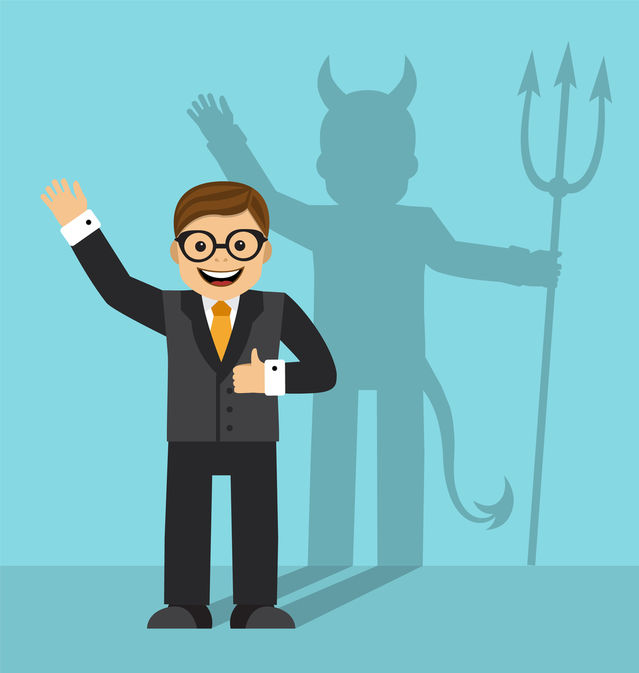Friends
Behind Frenemy Lines
How I’ve identified and dealt with toxic friendships.
Posted February 26, 2018

In 2006, I moved back to Los Angeles as an adult. I had not intended to return to my hometown unless it was to visit, but life made other plans. Those plans included a $100 bet I lost wagering that moving in with my significant other would last at least six months (in the memo section of the check I sent to the winner of said bet I wrote, “Live and learn!”), a near-death experience at 3 am uncontrollably shaking in septic shock, after which I spent four days in a New York hospital, and, on the plus side, an attractive job offer at a company near LAX. It seemed like the right move to head home and regroup.
Newly single, healthy and back in LA, I made a conscious effort to make new friends. Up to that point, I’d kept my circle of friends small and close, and of those few dear souls, many were not in LA anymore. I joined a running team, accepted all invites out to lunch or happy hour from my new co-workers and asked my good friends if they knew people in LA I might enjoy meeting. This period in my life is the only time I recall doing things with the main purpose of meeting new friends, instead of allowing them to be the natural result of shared places, hobbies and circumstances. During that year actively in search of friends, I accumulated some accidental romances and ultimately a boyfriend, one very dear friend I can’t imagine my life without, some folks I think of fondly but we don’t keep in touch, and lots of fun memories. And one more item: my first experience with a toxic friend.
I’d assumed bad friendships would be like the infection that landed me in an ambulance to the ER, conspicuously painful, debilitating. This was not the case with, as I’ll call her, frenemy #1. She was dynamic, charming and funny. She introduced me to great restaurants and knew the best spots to stay out dancing late into the night. She occasionally stopped by my office to say hello and tracked every event, concert and festival going on each weekend from Santa Barbara to Orange County. For a while, she was easily the person I most looked forward to seeing. A good time was guaranteed. Fast-forward a year and I started to see her very differently.
When she would suggest a cool new restaurant, it would turn out that she couldn’t cover her share of the bill for one reason or another and, since my job was going so well, maybe I wouldn’t mind paying until she could pay me back, but it was never a good time for that. The spontaneous visits at work became less about seeing me and more about waiting for traffic to die down before she made the rest of her drive home. The coffee dates she’d enthusiastically make she would cancel at the last minute over and over again. I still enjoyed her company, however, and as disappointed or taken advantage of as I’d often feel, I found lots of easy ways to justify and even defend her actions because she was my friend. One weekday night, however, when she’d asked to crash at my house on her way to or from a music festival, or event or something I’ve long forgotten, she went radio silent. She didn’t return my calls or texts to confirm if she was or wasn’t staying over, and my boyfriend and I didn’t know what to do. We both had to go to work in the morning and it was getting late. Worried and confused at 1 am, we left a note on the door about where to find our spare key and put extra blankets and pillows on the couch.
When I left for work at 6 am, tiptoeing across the living room, she was sprawled out and fast asleep. She never thanked me or apologized, choosing instead to launch into life’s latest drama in her next communication. I didn’t make any grand gesture of un-friendship or rebuke her, but this was the last time I saw her. We chatted occasionally, but my emotional bandwidth with her was all used up. In losing some respect for her as a friend, I had gained some clarity in my expectations and my boundaries for what friendship meant to me. Let me be clear, I lost respect for her as my friend, not for her as a person. I genuinely wish her the best now wherever she is, and I just hope she treats her friends with a bit more consideration.
Frenemy #1 allowed me to start the slow and winding process of demarcating the limits of acceptable behavior. I’m fortunate to say the friends who have followed in her tracks have been relatively rare, but they’ve made very similar footprints. Each one has led me to draw, redraw and further define when a friend crosses the line from honest mistake to disrespectful or malevolent behavior.
Even the best people I know and love have hurt my feelings accidentally or made a bad move. I certainly know I have. We all slip up occasionally and make less-than-thoughtful decisions, but when a friend repeatedly (I repeat, repeatedly) becomes like any of the profiles listed below, it’s time for me to back away and reevaluate:
1 – The One-sided Frenemy
This person only makes plans when it’s convenient or selfishly beneficial. A friend who needs help, a favor or immediate attention and, otherwise, is unavailable or uninterested in my life most likely won’t be there for me when it counts. If the person is still fun to be around, I make sure to only make plans when I’m not overextending myself. I’ve noticed that one-sided friendships are often situational. When the circumstances or the need for which they were forged goes away, the relationship with the frenemy will naturally fizzle out if I’m being honest with myself.
2 – The Unfiltered Frenemy
This person insults or embarrasses me either purposefully or inadvertently. If a friend insensitively discloses something I said in confidence or has a glass or two of wine and becomes caustic, spouting out cutting remarks in a large group, my danger sensors sound the alarm. If a friend makes a joke at my expense or behind my back, there’s a strong chance I’m dealing with this kind of frenemy— ill-intentioned, desperate for approval or craving attention. If this starts to happen with a good friend, I change the nature of our friendship. This person, if the damage hasn’t destroyed the friendship completely, gets one of two things: Either a very frank conversation with me about what happened, or an embargo on hearing about my personal life until I trust that the problem will not occur again.
3 – The Over-involved Frenemy
This person is far too invested in my life in ways I never wanted, or reaches out to my friends, family or significant other in an inappropriate way or without my permission. There is nothing more unnerving than a friend who justifies surreptitious contact knowing I would disapprove of it. I’m not talking about throwing a surprise party here. I’m talking about a friend reaching out to someone I care about in secret to find something out, prove a point or chastise someone ostensibly on my behalf when I chose not to do so. In this case, I have directly confronted friends in situations where I thought the person could learn from it. In other cases I’ve completely played dumb, choosing the satisfaction of stripping away the impact of their actions.
4 – The Competitive Work Frenemy
This person’s backhanded compliments, humble brags and passive-aggressive affronts to my self-worth are trademark moves. Typically I’ve found this hybrid strain of friend and foe develops in high-stakes professional or group settings where people are looking to get ahead or climb the social ladder. Having any challenging friendship tied to my career requires a certain level of tact, but in this specific case, the tactic that has served me best has been to quell the person with kind words and praise, to never take their remarks too seriously and to save any written correspondences that showcase their worst offenses. That way, I have something objective to show HR if the situation turns ugly.
5 – The Wounded Bird Frenemy
If crisis-mode seems to be a person’s only mode, if sentences constantly begin with, “I don’t know why all these things always happen to me,” or I find myself coming to a person’s rescue more than we share a meal, then I categorize the person as a wounded bird. When someone I’ve befriended has problems, my tendency is to help out as much as I reasonably can. In this case, however, wounded bird frenemies don’t want to get better, they just want more attention from others. In these instances, I’ve made rules about acceptable kinds of help. For example, I can listen to their troubles or occasionally run an errand if they're stressed out, but I can’t leave work abruptly or take calls at four in the morning to rush to their aid— only my absolute best friends (You know who you are) have that luxury.
Fortunately, the bad experiences I’ve had with frenemies have provided some extremely good residual effects. They've made my best friends look even better, and they’ve taught me endless lessons about self-respect, self-care and self-sufficiency, things I certainly wished I knew more about before I landed myself in the ER or made a stupid bet about my love life so many years ago.
In fact, one final lasting lesson from my bouts with unhealthy friendships can be summed up quite well by a line from the thank-you note I received from the winner of the aforementioned bet. It said, “Many people are characters, but few people have character.”
My closest friends have qualities indicative of great character: integrity, compassion, loyalty, to name a few. I learn from their examples. I must admit, though, that I’ve learned a great deal from my frenemies too; they've given me natural opportunities to rise above hurt feelings, vindictiveness and anger in order to strengthen my own character.




